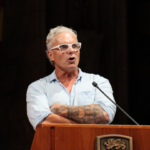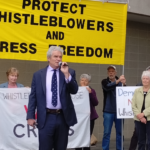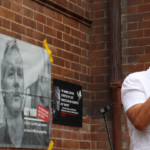McBride’s Crucifixion Highlights the Need for Whistleblower Protections in Australia

David McBride, a former Australian soldier and military lawyer, had little choice but to plead guilty to criminal charges including theft of property from a Commonwealth entity and unlawfully giving away defence information after his planned public interest defence – that he was acting in the public interest when he released information to the media – was refused by the court, delivering a “fatal blow” to his prospects of an acquittal.
An appeal against that ruling also subsequently failed, with Justice David Mossop determining that certain documents, if released, had the potential to jeopardise “the security and defence of Australia” and can therefore not be used by the parties.
Essentially, the court ruled that Mr McBride’s obligation not to disclose credible information about war crimes committed by Australian soldiers in Afghanistan superseded any duty to act in the interests of the Australian people by letting them know what was being done in their name.
Mr McBride’s reports fell on deaf ears
The court came to this decision despite the fact Mr McBride did in fact comply with prescribed procedures by bringing the reports to the attention of those who should have acted upon them, before, after his efforts fell on deaf ears over a long period of time, disclosing them to journalists for Australia’s national broadcaster, the ABC.
In that regard, Mr McBride wrote to his superiors who failed to act on the reports, before going to Australian Federal Police who also failed to do anything about them – despite the fact the AFP is meant to investigate and bring charges in relation to credible reports of war crimes perpetrated abroad.
Mr McBride then spoke to several senior Australian politicians who also did nothing.
It was only after several months of these efforts that Mr McBride disclosed the information to the ABC, knowing full well this could turn his life upside down, which it certainly did.
Which begs the question, what was he supposed to do? Remain silent and allow such abhorrent crimes which were reported to him by fellow Australian soldiers to continue? And later face the possibility of being accused of inaction or even complicity?
The saga raises a broader question: shouldn’t we be encouraging people to speak out about crime and misconduct in public departments, offices and other organisations and pursue those who engage in such conduct, rather than prosecute those brave enough to report it?
Many believe we should, but the reality here in Australia is whistleblowers are routinely persecuted rather than protected.
Calls for Whistleblower protection
Law reform appears to have been mooted by the Federal Government since the McBride case has been making headlines and irritating the Australian public, many of whom believe that David McBride should never have been prosecuted, particularly considering the fact that David McBride’s original leak to ABC journalists led to the “Afghan Files” programme which aired on the ABC in 2017.
The programme eventually led to the Brereton Report, published in 2020, which referred 19 personnel to the AFP for potential war crime prosecutions.
If the Federal Government takes action to reform whistleblower laws, it will be too late for David McBride.
Earlier this year, the Human Rights Law Centre (HRLC) released a report that assessed 78 court rulings in 70 separate cases in which whistleblowers sought protection under federal and state whistleblowing laws.
The report found there had “not been a single successful case … brought by a whistleblower” under different federal laws and that only 15 cases at a state or territory level where a whistleblower or a party acting for a whistleblower had been successful – a rate of about one in five.
In the wake of the report, the HLRC has made a number of key recommendations to be presented to the Federal Parliament. They include:
- The establishment of a whistleblower protection authority to oversee and enforce Australia’s whistleblower protections;
- Upgraded whistleblower protections for Australian public servants in line with domestic and international best practice, including a positive duty to protect whistleblowers and steps to make it easier for whistleblowers to enforce their rights;
- Consolidation and harmonisation of whistleblowing laws across the private sector in one new single law covering all non-public sector whistleblowers; and
- Stronger, simpler protections for whistleblowers who make disclosures to the media and members of parliament.
Dire need for whistleblower protection
The appalling treatment of Mr McBride not only highlights the dire need for whistleblower protections in Australia, but serves as a warning to those brave enough to expose crime and corruption by those within publicly-funded organisations that they – rather than those who engage in the unlawful conduct – will be prosecuted and have their lives turned upside down for doing the right thing and speaking the truth.







